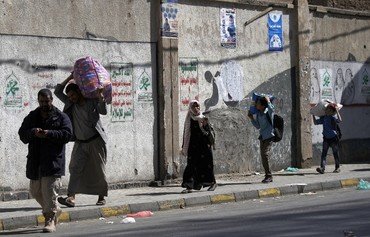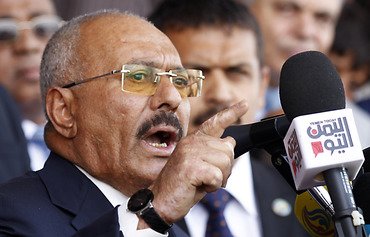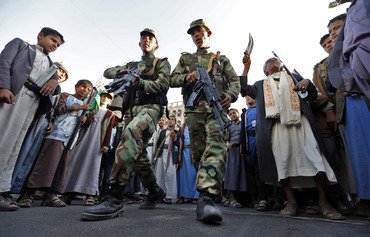The Houthis (Ansarallah) have tightened security in Sanaa on the second anniversary of the clashes that broke out between the Iran-backed militia and forces allied with ex-Yemeni president Ali Abdullah Saleh.
Saleh's General People's Congress (GPC) was allied with the Houthis until the end of 2017, when it staged a popular uprising against the militia.
The Houthis killed Saleh on December 4th, 2017 in Sanaa, following his call two days earlier for the uprising.
With fears of protests on the backdrop of anti-Iran demonstrations in Iraq and Lebanon, the Houthis have placed some GPC party leaders under tight guard and deployed new checkpoints around the city, local media reported.
The militia's actions come as several GPC leaders and activists have called for celebrations to mark the December 2nd uprising.
The Houthis had also barred GPC leaders from holding events to mark Yemen's independence day on November 30th.
Houthi violations boost opposition
The December 2nd uprising is a "popular uprising against the Houthi militia", said National Resistance Forces spokesman Col. Sadiq Duwaid.
"The people have expressed their rejection of injustice, backwardness, restrictions on freedoms and banditry," he said in a post on Twitter.
Despite the state of weakness that the GPC leaders that remain in Yemen face, they are still being placed under tight guard by the Houthis, said GPC general committee member Adel al-Shujaa.
This is to ensure "that no protests similar to those that have broken up in Lebanon and Iraq will take place", he told Al-Mashareq.
Political analyst Faisal Ahmed also said the Houthis fear the outbreak of protests against them similar to what is happening in Iraq and Lebanon, where protestors have been calling for an end to corruption and curbing the influence of Iran-backed militias.
"The Houthis' fears increased after some GPC leaders abroad and other party leaders called for revolting against the [militia]," he said.
The violations committed by the Houthis against the Yemeni people have increased opposition to the Iran-backed militia, he said, noting that this has made them "very cautious" and pushed them to announce they will quell any protests by force.
"This is proof that they fear a similar fate to that of Iran-backed militias in Iraq and Lebanon."

![A Houthi fighter slings a heavy machine gun on his shoulder as he walks down a street where the militia had clashed with loyalists of Yemen's slain ex-president Ali Abdullah Saleh, in Sanaa on December 6th, 2017. [Mohammed Huwais/AFP]](/cnmi_am/images/2019/12/02/21186-Yemen-Sanaa-Houthi-600_384.jpg)







This is an article that incites hatred and infighting. It has nothing to do with respectable journalism as it encourages discord.
Reply1 Comment(s)